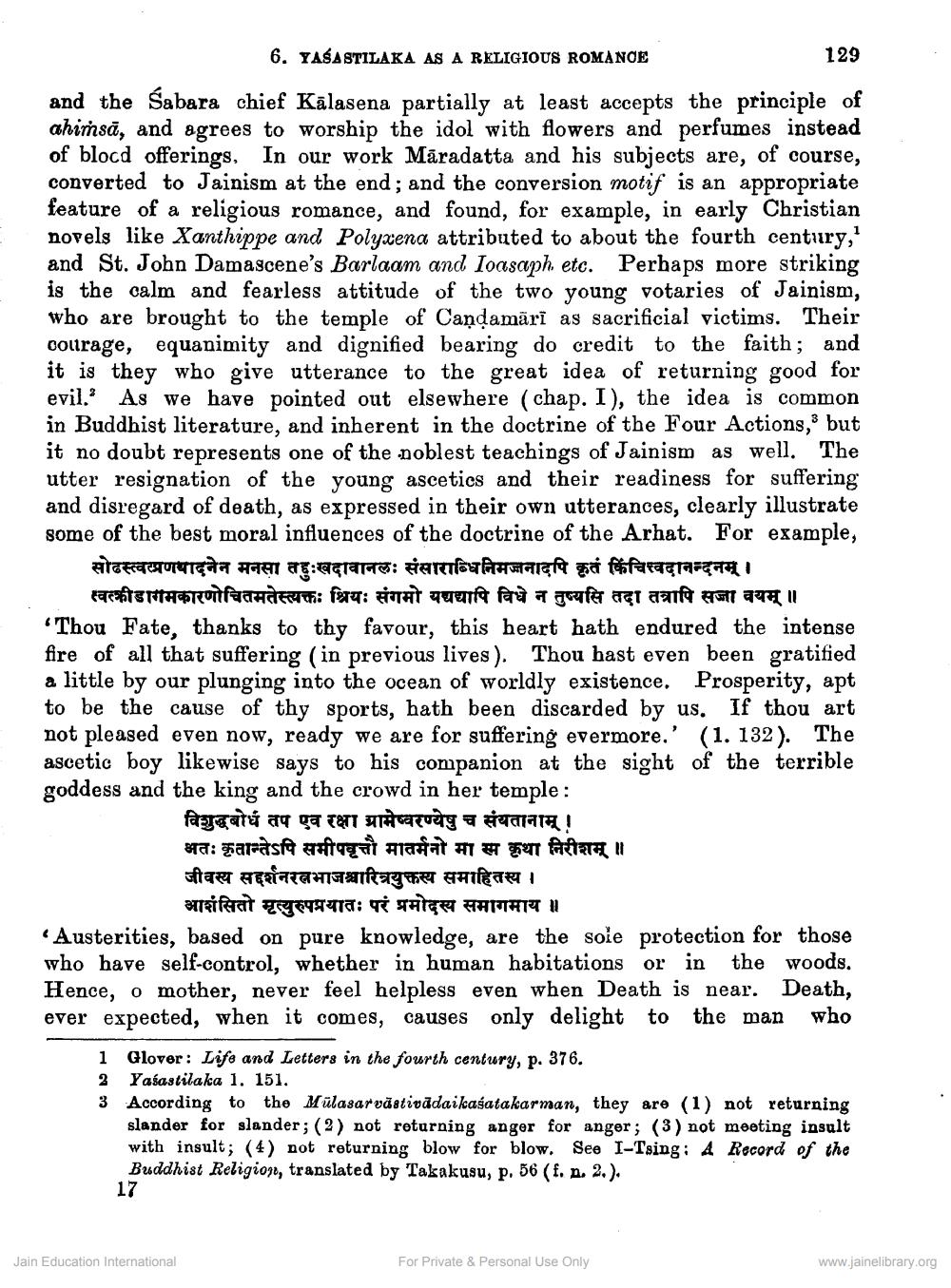________________
6. YASASTILAKA AS A RELIGIOUS ROMANCE
129
and the Sabara chief Kālasena partially at least accepts the principle of ahimsā, and agrees to worship the idol with flowers and perfumes instead of blocd offerings, In our work Máradatta and his subjects are, of course, converted to Jainism at the end; and the conversion motif is an appropriate feature of a religious romance, and found, for example, in early Christian novels like Xanthippe and Polyxena attributed to about the fourth century, and St. John Damascene's Barlaam and Ioasaph. etc. Perhaps more striking is the calm and fearless attitude of the two young votaries of Jainism, who are brought to the temple of Candamāri as sacrificial victims. Their courage, equanimity and dignified bearing do credit to the faith; and it is they who give utterance to the great idea of returning good for evil. As we have pointed out elsewhere (chap. I), the idea is common in Buddhist literature, and inherent in the doctrine of the Four Actions, but it no doubt represents one of the noblest teachings of Jainism as well. The utter resignation of the young ascetics and their readiness for suffering and disregard of death, as expressed in their own utterances, clearly illustrate some of the best moral influences of the doctrine of the Arhat. For example,
सोढस्त्वत्प्रणयादनेन मनसा तहःखदावानलः संसाराब्धिनिमजनादपि कृतं किंचित्त्वदानन्दनम् ।
स्वत्क्रीडागमकारणोचितमतेस्त्यक्तः श्रियः संगमो यद्यद्यापि विधे न तुष्यसि तदा तत्रापि सजा वयम् ॥ 'Thou Fate, thanks to thy favour, this heart hath endured the intense fire of all that suffering (in previous lives). Thou hast even been gratified a little by our plunging into the ocean of worldly existence. Prosperity, apt to be the cause of thy sports, hath been discarded by us. If thou art
ed even now, ready we are for suffering evermore.' (1. 132 ). The ascetic boy likewise says to his companion at the sight of the terrible goddess and the king and the crowd in her temple:
विशुद्धबोधं तप एव रक्षा ग्रामेष्वरण्येषु च संयतानाम् । अतः कृतान्तेऽपि समीपवृत्तौ मातर्मनो मा म कृथा निरीशम् ॥ जीवस्य सद्दर्शनरत्नभाजश्चारित्रयुक्तस्य समाहितस्य ।
आशंसितो मृत्युरुपप्रयातः परं प्रमोदस्य समागमाय ॥ "Austerities, based on pure knowledge, are the sole protection for those who have self-control, whether in human habitations or in the woods. Hence, o mother, never feel helpless even when Death is near. Death, ever expected, when it comes, causes only delight to the man who
1 Glover: Life and Letters in the fourth century, p. 376. 2 Yasastilaka 1. 151. 3 According to the Mülasar västivādai kasatakarman, they are (1) not returning
slander for slander; (2) not returning anger for anger; (3) not meeting insult with insult; (4) not returning blow for blow. See I-Tsing: A Record of the Buddhist Religion, translated by Takakusu, p. 56 (f. n. 2.).
17
Jain Education International
For Private & Personal Use Only
www.jainelibrary.org




